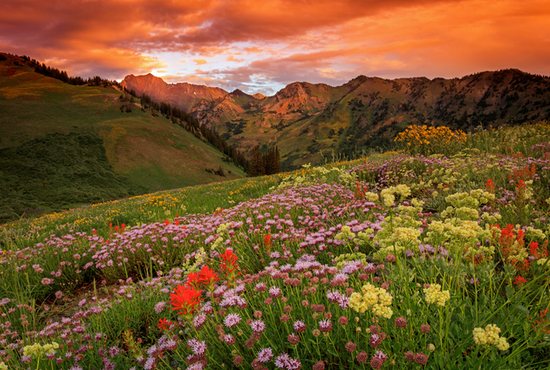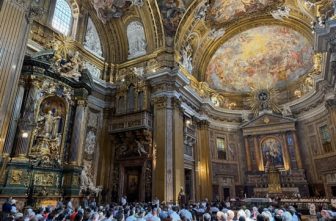
I love wildflowers. They sing to me the praises of God’s free creativity. I revel in their effortless beauty, delicate movements, and the sheer variety of color, size and shapes. They lift my heart on summer walks and have a calming effect on my over-taxed mind frenzied with the to-do lists, scheduling feats and worries for my loved ones, of a working wife and mom.
Wildflowers inspire reflection and turn my thoughts to God. St. Thérèse of Lisieux (1873-1897) discovered in a field of wildflowers, an analogy to the spiritual life and her personal vocation that changed her life. In her “Story of a Soul,” she wrote:
“I understood how all the flowers God has created are beautiful, how the splendor of the rose and the whiteness of the Lily do not take away the perfume of the little violet or the delightful simplicity of the daisy. I understood that if all flowers wanted to be roses, nature would lose her springtime beauty, and the fields would no longer be decked out with little wildflowers. And so it is in the world of souls, Jesus’ garden.”
This flower-inspired insight relieved her anxiety that she couldn’t do the “great” kinds of acts like she read about in the lives of the saints or martyrs. In addition, it focused her energy on doing small things with great love which she described as the Little Way and bolstered her with enthusiasm. Paradoxically, this Little Flower’s Little Way came to influence millions of Christians, and Pope St. John Paul II declared her a doctor of the Church in 1997.
In contrast to the whimsy of the wildflower is the paralysis of the worrier. Jesus juxtaposed these two dispositions in Matthew 6:24-34 and warned that we must choose between them.
Jesus said to his disciples: “No one can serve two masters. He will either hate one and love the other, or be devoted to one and despise the other. You cannot serve God and mammon.
“Therefore I tell you, do not worry about your life, what you will eat or drink, or about your body, what you will wear. … Learn from the way the wildflowers grow. They do not work or spin. But I tell you that not even Solomon in all his splendor was clothed like one of them. If God so clothes the grass of the field, which grows today and is thrown into the oven tomorrow, will he not much more provide for you, O you of little faith? …”
Jesus asks us, in effect, “Do you want to be a worrier or a wildflower?”
You can’t be both. The worrier takes the burdens of life completely on oneself, which leaves little to no room for trust in God or gifts from him. In contrast, the wildflower lives completely in trust of God and relationship of gift. The wildflower can focus on the task at hand which God asks of it, because it knows God will provide for everything else.
LET GO AND LET GODTo help ease worry:
- Develop the right frame of mind by praying a psalm each day.
To begin, try Psalms 23, 46, 62 and 119. - Keep a journal of God’s blessings; look back on it when tempted to worry. Remember that you are God’s wildflower, for whom he provides every necessary thing (and more).
- Keep a priority list and check it periodically. Make sure God remains first, and you are saying “yes” to the things that matter most.
But you may say, it’s the worriers who get things done. They’re so responsible. Wildflowers are pretty, but just passive and weak. I have found, however, in observation of both myself and others, that worrying gives all the appearance of work but very little actual productivity. Worrying tends to trigger stress reactions and slow a person down, if not paralyze them with anxiety altogether. Wildflowers, on the other hand, look pretty and effortless, but retain a genetic hardiness that manages to survive the severest attempts at eradication — from fire, to flood, to weed killer — they just keep coming back…and spreading!
Jesus asks us to do a reality check. Only one thing can be at the top of the priority list, and thereby direct all the choices below it. If we choose God, everything else will fall into place. If we choose anything else — self, pleasing others, ambition, beauty, fame, wealth — God will be edged out and worry will overtake us.
Jendro, a member of Holy Name of Jesus in Medina, teaches theology at Providence Academy in Plymouth. A Catholic speaker and writer, her website is taketimeforhim.com



